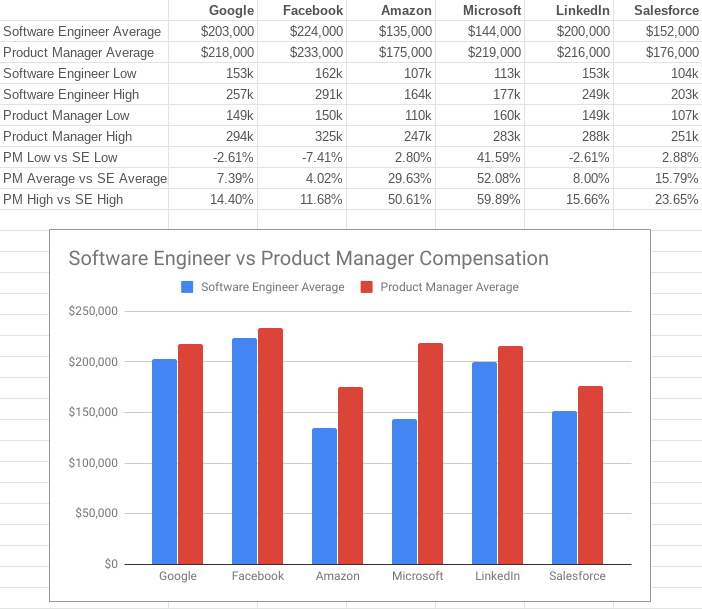 Organization
Organization
How should Product Managers ask for a raise or…
I get asked about compensation for product managers given their experience quite often by my students and, obviously, by those working for me. Here’s the best advice I can provide based on many conversations on the topic (including my own situations past). Note that much of this is generic to any knowledge worker position so I’ve added a few specific product manager salary tips as well.
Let’s separate the discussion between asking for a raise vs. a promotion. They are linked but not the same thing and the manager will have different considerations and elements under their control based on your ask.
Why are you asking for a raise?
Its always important for you to understand why you want a raise and be honest with yourself as to whether its the right driver:
- You feel underpaid relative to your peers/market. (can be a good reason)
- You are not able to pay your bills. (good reason)
- You just got offered a similar job at a higher wage. (can be a good reason)
- You saw some job listings that sound like you can get which are higher. (not a good reason)
- Your peers get paid more. (good reason but have to tread carefully)
- Your friends get paid more. (not a good reason)
- You like money. (not a good reason…if its just about the paycheck certainly there are higher paying, less rewarding jobs)
- You just killed it at work and are producing strong outcomes (not output) and are indispensable for your manager. (the best reason)
Asking for a raise not only takes gumption — so be convinced — but cannot be done often. Anyone who is constantly asking for more money likely will be labeled as one who’s just out for money (remember, its about the company mission, right?) or a complainer. Those are both career limiting.
How do I ask for a raise as a knowledge worker?
First, asking for a raise has a few factors a manager will consider:
- How long have you been with the company/team? And have you passed the “job hopping” threshold (currently around 18-24 months of tenure)?
- When (if ever) did you receive your last comp increase?
- How in-line (or out of) is your comp with your peers?
- How in-line (or out of) is your comp with the market (including if the company is current recruiting for similar hires)?
- What are the your concrete accomplishments? Were those notably above and beyond the expectations for your job / performance by your peers?
- How likely are you to leave and what is the implication of that (more on that below)?
- Will this comp change improve your happiness/morale/likelihood of staying (assuming we want that) vs. how much it actually costs me?
One thing most people misunderstand — and I know why because its probably the most common reason to deny someone a raise — is that budget is the biggest consideration. That’s rarely the case unless you’re asking for something enormous. Think about it this way: if you make $125k/year and ask for a 10% raise (which is a pretty big jump in any year) that’s just over $1k/mth for the company. Even most small businesses can easily absorb that.
What am I worth?
Ah, the big question. Most established companies have bands of salary ranges for different levels and job types in the organization. Hopefully, most keep to that. Knowledge workers, especially in tech product development, should have wide bands. If your company is not tech heavy, it might not. You should talk with your HR rep to get more information on this first so you don’t go banging up against a wall you cannot surmount.
If you determine there is room, there are a few factors to consider:
- What do you make now and do you have internal (be careful of using “John told me he makes $X as that will likely get John in hot water) or external facts to support that you’re underpaid?
- How much of an increase are you asking for? Cost of living is typically around 3% (and hopefully your company is already accounting for that). 10%+ is a big ask unless you have concrete evidence you are underpaid.
- Tying your comp to a piece of the rev/profits you’re driving is not a good road to go down unless you are solely driving that revenue (e.g salesperson).
What are salary bands based on experience for product managers?
Here’s a rough guide based on my sense of the current market. This is based on being in a tech center with cost of living notably above the mean (e.g. NYC, Boston; note that I’m excluding the fairy-tail land of SV unicorns and some of the big tech as that comp is wildly out of line with the rest of the market) (last updated Jan ’20):
- Associate Product Manager (entry level / no experience, if those exist): $75-100k (can go higher if coming from a strong background in a related field like eng)
- Line product manager (only one product), 3-5 years exp: $100-150k
- Line or Senior product manager, 5-7 years exp: $150-175k
- Group product manager (multiple products / teams): $175-225k
- VP, Product: $225k+
- SVP, Product: $300k (+/- 20%)
- CPO: * (varies wildly given its C-level but on par with CTO/CIO)
Tenure at the company also can influence this and that is not factored in here. In addition, this does not account for bonus or equity as that’s too variable by company based on their comp philosophy. Use as a rough guide only as many other factors can influence this. Evidence shows that PMs now make more than engineers on average at big tech firms.

How do I ask for a promotion in a flat organization?
Before asking for a promotion, know why you feel like you deserve a promotion:
- Do you feel bored and unchallenged in your job and want to take on more? Positive spin: have you mastered your job? (good reason)
- Is there an opening on the team? (might be a good reason)
- Did someone else on the team you feel is similar or below your abilities/contribution just get promoted? (bad reason)
- Did you get offered another job which is more senior? (can be a good reason but that means you’re open to staying)
- Did you lay out a specific career path and you aren’t on it (or your friends are getting promoted and you’re not)? (not a good reason)
- Your teammates love you? (not a good reason)
- Are you good “friends” with your manager? (not for long and not a good reason)
Let’s first understand the two general types of promotions (note that “battlefield promotions” aren’t considered here):
- Merit promotion: You get an enhanced title, a bit more money and responsibility in recognition of the outcomes you have achieved. Generally, this is something a mid-level manager can decide as it has only minor implications on the org and budget. An example of this is going from “Product Manager” to “Senior Product Manager”. You get the recognition but generally have the same relationship with your peers. Your arguments here should focus on your achievements and they should be concrete, irrefutable and above the call of duty.
- Responsibility promotion: You get significantly more responsibility and authority including changing the relationship with your peers (e.g. becoming a/their manager). These typically happen when a position — backfill or new in the org — opens. This is a larger consideration that might be outside your manager’s sole purview as it likely has broader implications in the organization. There are two considerations here: does the person deserve it (basically an enhanced merit promotion conversation) and can they handle it. The latter is the most nebulous but important aspect. Are you the right person to manage if you haven’t before? You’re so good in your role now, should we disturb that? Will you be happy and effective in your new role? Have you hit your natural maxima in this role/org and you’re not seen as able to take on the next level of responsibility? These considerations tend to influence the decision the most and will be the most difficult for you to get an honest assessment of.
One other thing a responsibility promotion entails is ensuring that the organization has / can create the opening for you. This reasonably might be outside your manager’s control and have broader political implications they’re not willing to go to bat for you on.
Does threatening to quit work?
Almost never and I would not go there. Even if you have another job offer in hand, why would you go back to your employer asking for a promotion or money after going through all the trouble of getting a new job? This isn’t a good strategy to get something from your current employer. They will see through this and might be happier knowing you’re somewhere else.
How indispensable is this person?
All-in-all, here’s the simple way I always look at people on my team at review time or when they ask for raises/promotions (and I know that most senior leaders look at it this way whether they admit it or not):
When managers make comp & promotion decisions they know they are delivering a message. They tend to fall into one of three categories:
- “You’re indispensable“: If you leave, how easily can I replace you (i.e. are we screwed)? If so, I’ll make accommodations for you. Even if I’m not immediately able to pay/promote you, I’ll make some informal promises to keep you happy.
- “You’re solid but not indispensable“: It will hurt but I can replace you internally or with a relatively painless external hire. I might accede a bit on comp but not likely on promotion if I feel you’re in the right position now (natural maxima).
- “You need to go“: I’m not bold enough or want the hassle/morale hit of actually firing you but hope you self-select out. If you’re getting this message, its probably not a good fit and use it as a time to exit gracefully and on your terms (they might pay you to hunt for a job).
This is why, when it comes to review and bonus season, managers — who inevitably have less to give out than they want — have to look at their staff this way. The #1s need to be over indexed on and the #3s need to be starved (so that hopefully they’ll quietly self-select out…and soon). The #2s end up bearing a bit of the brunt if the #1 group needs to pull from their pool. Whichever category you’re in significantly influences your ability to negotiate. First, try to get an honest understanding of that (for another post).
How will this person’s happiness (and remaining with the team) affect morale?
The other factor a manager considers is the potential affect of you not being happy / leaving on the rest of the team. Are you well liked and easy to work with? Do you pick up the slack and cover for others? Do you drive people nuts? Are you not carrying your weight? You not being there could actually improve morale. This is a challenging calculation that good managers have their finger on the pulse of.
How aggressive should I be in asking for a raise and/or promotion?
The simplest advice I can give is that if you’ve been at your job for over 18 months and know you’ve been performing well — and well means above expectations…you don’t get promotions for showing up every day — you should start the conversation. The first response will likely be to put it on the radar and have it formally considered at the next review time or another milestone (unless you’ve already achieved #1 status above). Be patient but hold your manager to this commitment and ask for what you need to do to get this.
How do I interpret my manager’s response?
You need to read between the lines a bit and possibly ask some follow-up questions:
- No with reasonable justification: “company policy is that we only consider comp changes in Q1” (confirm this is true), “I cannot do anything now but let’s reconvene on this in 1-2 quarters” (make sure this happens), “Deliver that product successfully hitting your KPIs and then we’ll discuss” (get it done and then take it up), “You’re above most/all of your peers so increasing you more would just create a bigger disparity” (could be true; ask for more data and provide market comps as the company might be out of line; doesn’t mean you can’t get more in the future), “You’re not ready, but can be” (get the terms and what you need to do)
- No with non-answer: “I don’t have any budget” (see above), “You’re at the top of our range for your level/experience” (ask what the ranges of more recently hired peers are; come back with market data if you can)
- Yes with counter-offer: “I can’t do $10k but how about $5k” (ask for the reasoning)
- Yes: congrats but use it as an opportunity to understand their expectations of you as they might have reset
Again, I never advise threatening or asking over and over unless you get an a “non-answer” as outlined above. Getting an answer you aren’t happy with is not a non-answer. Just ask for what you need to do to be inline for something.
Don’t put your manager’s back to the wall. That will only strain your relationship. If you already have a strained relationship you don’t think you can repair, you should already be looking for another role/job.














